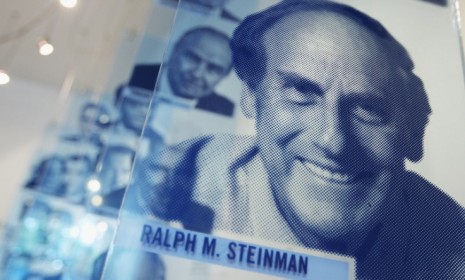How did the Nobel Prize get awarded to a dead scientist?
The rules require that the Nobel Committee give the prize to a living scientist. But Ralph Steinman won the award several days after he passed away

A free daily email with the biggest news stories of the day – and the best features from TheWeek.com
You are now subscribed
Your newsletter sign-up was successful
According to longstanding rules set by the Nobel Prize committee, only living scientists are eligible to receive the coveted award. Yet when the committee announced its decision Monday to award the Nobel Prize for Medicine to three different winners, including Canadian scientist Ralph M. Steinman, it found itself in the rather odd situation of honoring a dead scientist with the prize. Here's what you should know:
How did this happen?
Upon trying to reach Professor Steinman to tell him the news of his award, committee members learned that Steinman had died on Friday after a four-year battle with pancreatic cancer. The committee's deliberations had remained "a closely guarded secret" until winners were announced Monday morning, writes Richard Orange at Britain's Telegraph, and "the situation only became apparent" when the committee couldn't reach Steinman, who had been unconscious since Thursday after spending almost a week in the hospital.
The Week
Escape your echo chamber. Get the facts behind the news, plus analysis from multiple perspectives.

Sign up for The Week's Free Newsletters
From our morning news briefing to a weekly Good News Newsletter, get the best of The Week delivered directly to your inbox.
From our morning news briefing to a weekly Good News Newsletter, get the best of The Week delivered directly to your inbox.
Who was Steinman?
The 68-year-old cellular biologist's groundbreaking research on the immune system not only led to the first-ever vaccine that kills tumors, but also allowed him to prolong his own battle with pancreatic cancer. Steinman's "life was extended using a dendritic-cell based immunotherapy of his own design," says his employer, Rockefeller University in New York. Discovered by Steinman in the 1970s, dendritic cells are critical for fighting infections and have "helped lay the foundations for a new wave of 'therapeutic vaccines,'" treating everything from rheumatoid arthritis to bacterial infections to cancer.
And Steinman keeps his award?
The committee ultimately decided to award the $1.4 million prize to Steinman's family, citing a stipulation that allows the committee to give the prize to a recipient who dies before actually receiving the award — which they saw as a more fitting interpretation of events. Orange reports that officials believe this is the first time in the prize's 110-year history that a winner died before the announcement. Even Steinman seemed to know the rules, reportedly joking to his daughter: "I know I have got to hold out out for that. They don't give it to you if you have passed away."
A free daily email with the biggest news stories of the day – and the best features from TheWeek.com
Sources: BBC, Reuters, Telegraph, Vancouver Sun